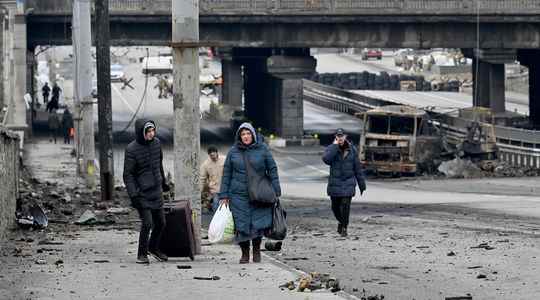The noose is tightening around Kiev. A British television crew was attacked earlier this week outside the Ukrainian capital and one of the journalists was shot and wounded, their employer, the Sky News television channel, announced. Fighting continues to rage in the city. In recent days, several blows have already been struck against him, one of the latest being the strike on the television tower in the Ukrainian capital. On the tenth day of the invasion, this Saturday, March 5, Russian troops are trying to increase the pressure. “Today, Vladimir Putin has concentrated his efforts more in the south in order to completely cover the Black Sea. From now on, he is launching a second phase in Kiev by intensifying the bombardments on the cities around,” Dominique Trinquand told L’Express, retired general and former head of the French military mission to the UN in New York.
The Kremlin’s objective: to encircle the capital and seize it. “We are therefore truly going to the siege of Kiev, and the battle will increase very much in power”, indicated on March 2 to L’Express, Michel Goya, former colonel of the navy troops. A week earlier, few people were counting on the resistance of Ukraine’s largest city against the world’s second largest military power. On paper, the balance of power appeared very unbalanced between Russia and its neighbour. At the end of February, this city of 2.8 million inhabitants was surrounded, suggesting that the trap was about to close on its inhabitants. “The capture of Kiev was President Putin’s objective, he intended to take it by surprise. This did not work”, rewinds Dominique Trinquand. Ten days after the start of the Ukrainian invasion, Kiev resists and Russia changes its strategy.
Why did the Russian forces fail to achieve their objective? First element of response: Vladimir Putin retains his strike force. “The capture of Kiev is a serious subject, it is a symbolic city for the Russians so he cannot raze it”, develops Dominique Trinquand. According to the specialist, this decision would not come from the Russian president – whom he describes as “cynical” – but would rather come from his entourage, wishing to prevent catastrophic images from isolating Russia a little more. Devoid of this firepower, the Russian army seems to have difficulty taking the capital by force. While Vladimir Putin thought he was carrying out a blitzkrieg, the Russian army is underutilized, especially in the aviation sector. Result: the control of the sky by the men of Moscow is not total and there is a bad coordination between the men on the ground and the aviation. “Aviation is used around Kiev, but there have been very few attacks inside”, continues Dominique Trinquand.
Coordination problems on the Russian side
Thus, Vladimir Putin’s troops have reserves, but they experience organizational difficulties on the ground. “For more than three days, the Russian forces have not advanced on Kiev. Officially because of the talks but in reality because of the resistance of the Ukrainian forces and especially the logistical problems inherent in such a concentration of armored vehicles…”, explains on Twitter Cédric Mas, military historian. The Russian army suffers from a lack of coordination on the ground. “There are two types of organization: in the south, there is the steamroller, which is extremely efficient. It works well. After surrounding the cities, it manages to bring them down like Mariupol. In the north, it was thought that Kiev would fall quickly, so there are less experienced troops who came from Belarus where they were on maneuvers, “says Dominique Trinquand.
In terms of equipment, the north also seems aggrieved. “We do not see advanced equipment. We observe armored trucks which transport troops but quite a few tanks”, underlines Dominique Trinquand. Added to this are Russian staffs who lack experience in the field. So many signs that Vladimir Putin underestimated the Ukrainian resistance thinking that the city was going to fall like a ripe fruit. In Kiev, the reservist fighters represent a precious help on the ground. Many of them are in the northern districts of the city. Another advantage for the Ukrainians: they fight at home and know the territory well. Videos and photographs verified by the New York Times seem to show that two bridges leading to Kyiv have been destroyed, a new tactic Ukraine appears to be using to defend the capital.
One thing is certain: the Russian army is slowing down on the outskirts of Kiev and must take the time to reorganize. “Putin’s forces will concentrate their means to go and do street fighting in Kiev, which is very dangerous”, says the retired general. While Vladimir Putin thought to seize this symbolic city in a few days, the head of state was therefore forced to review his plans in the face of Ukrainian resistance. “When the Russian president has obtained what he wants in the south of Ukraine, if Kiev has not fallen, it will remain a bargaining chip in a negotiation”, estimates Dominique Trinquand.
